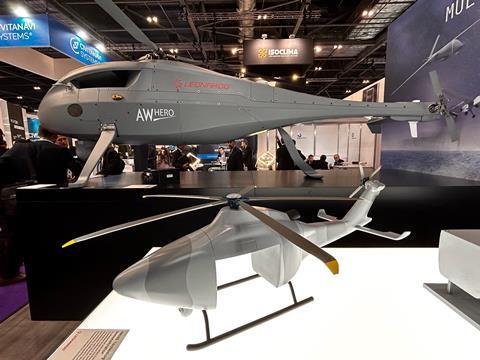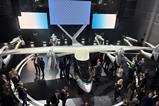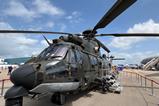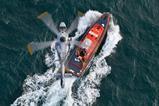Leonardo Helicopters has based its initial Proteus uncrewed technology demonstrator on the AW09 light-single, FlightGlobal can reveal.
Described as an “airborne collaborative platform”, the modular Proteus is being developed at Leonardo’s Yeovil site on behalf of the UK Ministry of Defence and Royal Navy (RN) under a four-year, £60 million ($77 million) contract.

Little has been disclosed about the Proteus since its launch in 2022, with the various mock-ups displayed by Leonardo Helicopters in the intervening period described as unrepresentative of the prototype.
But multiple sources with knowledge of programme have told FlightGlobal that the demonstrator aircraft – due to fly in the first quarter of next year – is based on the AW09.
A 2.8t maximum take-off weight helicopter, the AW09 was acquired by Leonardo Helicopters in 2020 when it bought Switzerland-based developer Kopter. The rotorcraft is powered by a single 1,000shp (750kW) Safran Helicopter Engines Arriel 2K.
Since taking over Kopter, Leonardo Helicopters has repeatedly said it will use the Swiss company as a centre for innovation related to single-engined rotorcraft, looking at advanced technologies including hybrid or electric power.
Leonardo declines to comment on the origin of the platform, adding: “It is an all-new demonstrator with a modular system.”
Use of an existing – although uncertificated – platform would offer benefits in terms of simplicity and maturity, allowing the company to focus on testing the autonomous technologies critical to its deployment.
While the cabin and fuselage for Proteus will clearly differ over the standard AW09, retaining the helicopter’s dynamic components, transmission and engine brings an element of risk reduction.
The RN sees uncrewed systems as forming a core part of its fleet for anti-submarine warfare support missions in the 2040s. However, other potential missions for Proteus include intelligence, surveillance and reconnaissance, and logistics supply.
Speaking during a media briefing at the Farnborough air show, Adam Clarke, managing director of Leonardo Helicopters in the UK, declined to provide specifics such as the origin of the engine or drivetrain on the Proteus programme but said it is “based on different technologies within Leonardo”.
However, he says that as a technology demonstrator, the “principle is to demonstrate capabilities in terms of autonomous rotorcraft”.
“We are utilising the skills and experience across our whole company. We are taking new innovations in terms of autonomy, in terms of structures, of rotorcraft and trying to make sure you get the biggest bang for your buck, because there is a limited amount of money.
“Therefore, we need to demonstrate real autonomy and we are going to be flying something next year.”
Current evaluations are using a one-third-scale model of the Proteus for windtunnel tests, says Clarke.
Previous unmanned trials conducted by Leonardo Helicopters on behalf of the RN used the 1.8t SW-4 Solo, an optionally piloted version of a helicopter built by its PZL Swidnik subsidiary in Poland.































